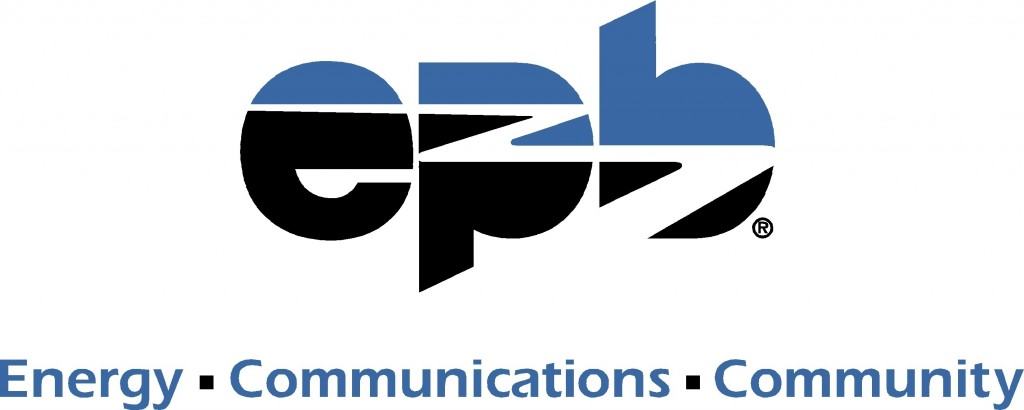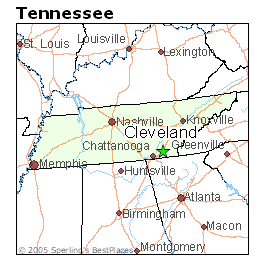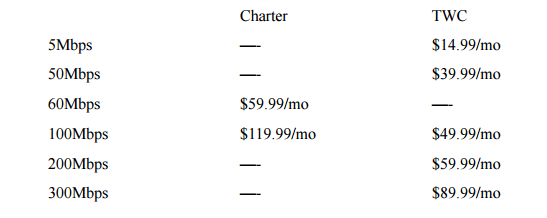
Cleveland’s monument in the downtown district. (Image: City of Cleveland)
AT&T, Comcast, and Charter have surrounded the city of Cleveland, Tenn., (population 42,774) for more than 20 years, yet after all that time, there are still many homes in the area that have no better than dial-up Internet access..
An effort to extend municipal utility EPB’s fiber to the home service into the community just northeast of Chattanooga on Interstate 75, has run into organized political opposition campaign, part-sponsored by two of the three communications companies serving the area.
Tennessee state Reps. Dan Howell and Kevin Brooks, both Cleveland-area Republicans, understand the implications. With AT&T, Comcast, and Charter resolute about not expanding their coverage areas anytime soon, the only chance Cleveland has of winning world-class broadband anytime in the reasonable future is through EPB, which has already offered to extend service to at least 1,000 customers in rural Bradley County in as little as three months. Most of those customers now rely on dial-up Internet services, because no broadband is available. Reps. Howell and Brooks are trying to get the the red tape out of the way so EPB can proceed, but the Tennessee legislature hasn’t budged.

EPB provides municipal power, broadband, television, and telephone service for residents in Chattanooga, Tennessee
There is a substantial difference between 30kbps dial-up and 100Mbps — one of the “budget” Internet tiers available from EPB. But some Tennessee lawmakers and corporate-backed special interest groups don’t care. To them, stopping public broadband expansion is a bigger priority, and they have attempted to stall, block, or prohibit municipal broadband, just to protect the current phone and cable companies that are among their generous contributors.
In 2010, Chattanooga became the first in America to enjoy gigabit residential broadband speed not because of AT&T, Comcast, or Charter, but because of the publicly owned electric company, EPB. So what’s the problem with that? The fact EPB spent $320 million on the fiber optic network — about $100 million of that coming from a federal grant — keeps some conservatives, corporate executives, and telecom shareholders up at night. They object to the public funding of broadband, calling it unfair competition for the two incumbent cable companies and one phone company, which have their own “privately funded” networks.
Republican Rep. Mike Carter, who serves Ooltewah, thinks that’s a lot of nonsense. He notes AT&T and other providers already receive government funding to service outlying areas that no other providers dare to tread for a lack of return on their investment.
 “[What] convinces me to back expansion of the EPB of Chattanooga is the fact that they received $111 million in stimulus funds, and in the next five years AT&T alone will receive $156 million of your money [in government funding] assessed every month on your bill to provide 10/4-gigabit service in those areas,” Carter explained to the Chattanooga Times-Free Press. “If the EPB’s $111 million matching grant somehow disqualifies those benefits going to my constituents, how do I explain to them that AT&T is receiving non-matching funds?”
“[What] convinces me to back expansion of the EPB of Chattanooga is the fact that they received $111 million in stimulus funds, and in the next five years AT&T alone will receive $156 million of your money [in government funding] assessed every month on your bill to provide 10/4-gigabit service in those areas,” Carter explained to the Chattanooga Times-Free Press. “If the EPB’s $111 million matching grant somehow disqualifies those benefits going to my constituents, how do I explain to them that AT&T is receiving non-matching funds?”
“The issue then became, if it is necessary to create the world’s fastest Internet system, why would EPB not offer that for economic growth in its service area?” Carter continued. ” After I heard the story of the [gig’s] creation and realized that the money had already been spent, I asked myself if I would allow a firmly held principle of no competition with private enterprise by government to deny my constituents and neighbors the incredible benefits.”
Justin Owen, president and CEO of the Beacon Center of Tennessee, is dismissive of Carter’s willingness to bend his principles. In his view, those without Internet access have other options instead of getting EPB Fiber on the public dime.

Owen
“You can get satellite Internet,” said Owen, who added that governments that invest in fiber technology could be “left behind by disruptive innovation,” which in his mind could be satellite Internet. Satellite customers would disagree.
“Horrible, horrible, horrible, and more horrible,” wrote Trey from another Cleveland — this time in Texas. “Speeds are consistently less than 2Mbps and they advertise up to 12. Try a cell phone booster and use that before resorting to satellite Internet.”
Hundreds of customers shared similar stories about their experience with satellite Internet, and they don’t believe it will be disruptive to anything except their bank account.
Owen and his group have not revealed many details about where its funding comes from, but the group is a member of the State Policy Network, which receives financial support from AT&T, Time Warner Cable, Verizon and Comcast. The group’s former leader, Drew Johnson, was also a former opinion page columnist at the Times-Free Press and used column space to criticize EPB and other issues that ran contrary to AT&T’s agenda in Tennessee.
Despite support from the Chattanooga area’s Republican delegation, many legislators from outside the area remain firmly in support of the telecom companies and their wish to limit or destroy community broadband projects like EPB, claiming they are redundant or are based on faulty business plans likely to fail. But while Comcast used to dismiss EPB’s gigabit service as unnecessary and AT&T considered gigabit speeds overkill, both companies are now racing to deploy their own gigabit networks in Chattanooga to compete.
The residents of Cleveland without broadband today probably won’t have it tomorrow or anytime soon. Many are hoping the Tennessee legislature will relent and let EPB solve their broadband issues once and for all. Cleveland resident Aaron Alldaffer is trying to help gin up interest in a renewed legislative push for EPB Fiber expansion with a Change.org petition.
The BBC World Service Global Business program visited Chattanooga in May 2016 to explore EPB Fiber and discuss its implications. (29 minutes)
You must remain on this page to hear the clip, or you can download the clip and listen later.


 Subscribe
Subscribe How much you use the Internet is often a matter of how fast your broadband connection is, according to a new study.
How much you use the Internet is often a matter of how fast your broadband connection is, according to a new study.
 Cox Communications will push broadband speed upgrades as high as a gigabit to customers over an upgraded network heavy on fiber and much lighter on copper coaxial cable.
Cox Communications will push broadband speed upgrades as high as a gigabit to customers over an upgraded network heavy on fiber and much lighter on copper coaxial cable. Stop the Cap! continues the fight for a better deal for Time Warner Cable customers that could soon end up as Charter Communications customers, if the California Public Utilities Commission (CPUC) approves the merger.
Stop the Cap! continues the fight for a better deal for Time Warner Cable customers that could soon end up as Charter Communications customers, if the California Public Utilities Commission (CPUC) approves the merger.

 “Clearly these TWC customers are materially much worse off under New Charter than TWC,” Friedman told the CPUC. “Equally clear is that Charter’s ‘Simplified Pricing’ (perhaps more accurately described as ‘Fewer Options and Higher Prices’) is far from a public benefit. This massive price increase will affect literally every stand-alone-broadband TWC customer other than the few who qualify for the School Lunch/Senior Assistance plan. While the low-cost School Lunch/Senior Assistance plan is great for the narrowly targeted group of consumers who manage to qualify, roughly doubling the cost of broadband for every other standalone customer more than offsets the combined value of every other ‘benefit’ that the applicants allege will come from this transfer.”
“Clearly these TWC customers are materially much worse off under New Charter than TWC,” Friedman told the CPUC. “Equally clear is that Charter’s ‘Simplified Pricing’ (perhaps more accurately described as ‘Fewer Options and Higher Prices’) is far from a public benefit. This massive price increase will affect literally every stand-alone-broadband TWC customer other than the few who qualify for the School Lunch/Senior Assistance plan. While the low-cost School Lunch/Senior Assistance plan is great for the narrowly targeted group of consumers who manage to qualify, roughly doubling the cost of broadband for every other standalone customer more than offsets the combined value of every other ‘benefit’ that the applicants allege will come from this transfer.” Time Warner Cable Maxx upgrades are on the way for customers in several Wisconsin cities, bringing all-digital cable television service later this year in preparation of boosting broadband speeds up to 300Mbps.
Time Warner Cable Maxx upgrades are on the way for customers in several Wisconsin cities, bringing all-digital cable television service later this year in preparation of boosting broadband speeds up to 300Mbps.